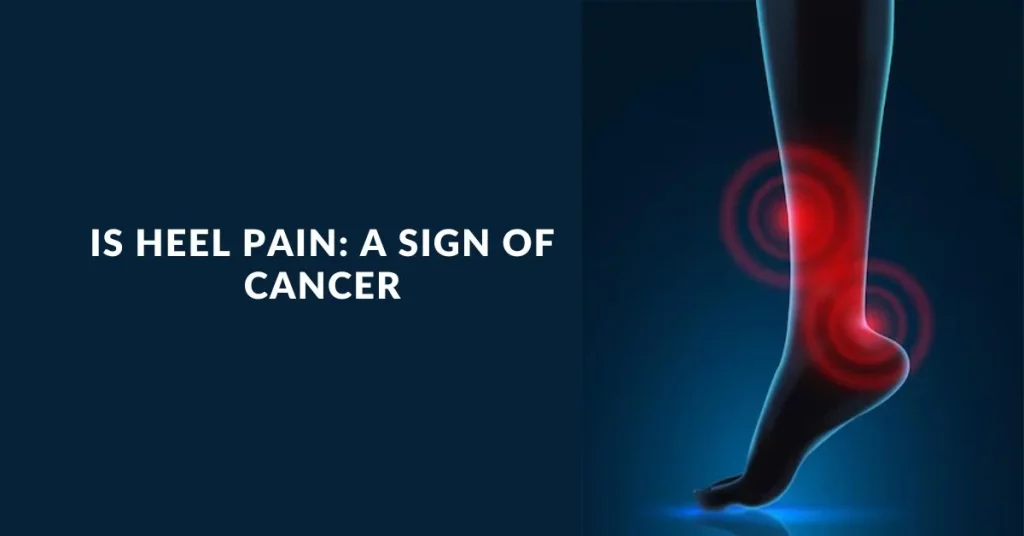Introduction
Heel pain is a common ailment that affects millions of people worldwide. While it’s often associated with conditions like plantar fasciitis or Achilles tendonitis, could it also be a sign of something more serious, like cancer? In this comprehensive guide, we’ll explore the relationship between heel pain and cancer, providing insights, expert opinions, and actionable advice to help you understand and address this concern.
Understanding Heel Pain
Heel pain can manifest in various forms, ranging from mild discomfort to debilitating agony. It commonly occurs due to overuse, injury, or structural abnormalities in the foot. Conditions like plantar fasciitis, Achilles tendinitis, heel spurs, and stress fractures are frequent culprits behind heel pain. However, when the pain persists despite conservative treatments or is accompanied by other concerning symptoms, it’s crucial to consider underlying health issues, including the possibility of cancer.
Heel Pain: An Early Warning Sign?
While heel pain is typically associated with musculoskeletal problems, it can sometimes serve as an early indicator of more serious health issues, including certain types of cancer. Several cancers, such as bone cancer or metastatic tumors, can affect the bones and soft tissues in the foot, leading to localized pain in the heel area. Additionally, cancers that spread to distant sites, known as metastases, may present with heel pain as a secondary symptom.
Common Types of Cancer Associated with Heel Pain
- Bone Cancer Bone cancer, although rare, can originate in the bones of the foot or metastasize from other primary sites. Symptoms may include persistent heel pain, swelling, and tenderness, particularly at night or during activity.
- Metastatic Tumors Cancer that spreads (metastasizes) from other organs to the bones of the foot can cause localized pain and discomfort, including in the heel. Patients with a history of cancer should be vigilant about monitoring any new or worsening heel pain.
- Soft Tissue Sarcomas Soft tissue sarcomas are cancers that develop in the muscles, tendons, or connective tissues of the foot. While less common than bone cancers, they can still present with heel pain and swelling, often accompanied by a palpable mass or lump.
Recognizing the Warning Signs
It’s essential to distinguish between benign causes of heel pain and potential indicators of cancer. While most cases of heel pain resolve with rest, ice, stretching, and supportive footwear, persistent or worsening symptoms should prompt further evaluation by a healthcare professional. Warning signs that warrant medical attention include:
- Persistent Pain: Heel pain that persists for several weeks despite conservative treatments.
- Night Pain: Pain that worsens at night or during periods of rest.
- Unexplained Swelling: Swelling or inflammation in the heel area without a clear cause.
- Localized Tenderness: Tenderness or sensitivity in specific areas of the heel, especially with palpation.
- Systemic Symptoms: Concurrent symptoms such as unexplained weight loss, fatigue, or night sweats.
Diagnostic Evaluation
When evaluating heel pain, healthcare providers will conduct a thorough medical history and physical examination to assess for underlying causes. Diagnostic tests such as X-rays, MRI scans, CT scans, or bone scans may be ordered to visualize the bones and soft tissues of the foot and detect any abnormalities or lesions suggestive of cancer.
Treatment and Management
Treatment for heel pain associated with cancer will depend on the underlying cause, extent of the disease, and overall health of the patient. Options may include:
- Surgical Intervention: Surgical removal of tumors or affected bone tissue.
- Chemotherapy: Systemic treatment to target cancer cells throughout the body.
- Radiation Therapy: Localized radiation to shrink tumors and alleviate pain.
- Palliative Care: Symptom management and supportive care to improve quality of life.
FAQs (Frequently Asked Questions)
- Can heel pain be a symptom of cancer? Yes, in some cases, heel pain can indicate underlying bone cancer or metastatic tumors.
- How common is heel pain as a sign of cancer? Heel pain as a symptom of cancer is relatively rare but should not be ignored, especially in individuals with a history of cancer.
- What should I do if I have persistent heel pain? If you experience persistent heel pain, especially if accompanied by other concerning symptoms, it’s essential to consult with a healthcare professional for further evaluation and management.
- Are there any risk factors for developing cancer-related heel pain? Risk factors for cancer-related heel pain include a history of cancer, prior radiation therapy, or underlying bone disorders.
- Is heel pain always indicative of a serious underlying condition? While most cases of heel pain are benign, it’s essential to rule out serious underlying causes, including cancer, particularly if symptoms persist or worsen over time.
- What are the treatment options for cancer-related heel pain? Treatment options may include surgery, chemotherapy, radiation therapy, and palliative care, depending on the type and stage of cancer.
Conclusion
While heel pain is a common complaint, it’s essential to consider the possibility of underlying health issues, including cancer, particularly in cases of persistent or unexplained symptoms. Early detection and prompt intervention are crucial for optimizing outcomes and improving the quality of life for individuals affected by cancer-related heel pain.



